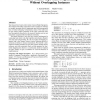128
click to vote
OOPSLA
2010
Springer
15 years 14 days ago
2010
Springer
Type classes were originally developed in Haskell as a disciplined alternative to ad-hoc polymorphism. Type classes have been shown to provide a type-safe solution to important ch...
114
click to vote
JFP
2010
15 years 15 days ago
2010
Earlier studies have introduced a list of high-level evaluation criteria to assess how well a language supports generic programming. Languages that meet all criteria include Haske...
107
click to vote
ICFP
2010
ACM
15 years 3 months ago
2010
ACM
Type classes have found a wide variety of uses in Haskell programs, from simple overloading of operators (such as equality or ordering) to complex invariants used to implement typ...
120
click to vote
SFP
2004
15 years 3 months ago
2004
Abstract: Generic programming can bring important benefits to software engineering. In particular, it reduces the burden of verification, since generic proofs can be instantiated a...
120
click to vote
TPHOL
1995
IEEE
15 years 5 months ago
1995
IEEE
This paper presents a survey of HOLCF, a higher order logic of computable functions. The logic HOLCF is based on HOLC, a variant of the well known higher order logic HOL, which o e...
101
click to vote
ESOP
2000
Springer
15 years 5 months ago
2000
Springer
Abstract. Type classes in Haskell allow programmers to define functions that can be used on a set of different types, with a potentially different implementation in each case. For ...
116
click to vote
FOAL
2007
ACM
15 years 6 months ago
2007
ACM
We consider the problem of adding aspects to a strongly typed language which supports type classes. We show that type classes as supported by the Glasgow Haskell Compiler can mode...
119
click to vote
IFL
2001
Springer
15 years 6 months ago
2001
Springer
Abstract. Generic programming enables the programmer to define functions by induction on the structure of types. Defined once, such a generic function can be used to generate a s...
123
click to vote
PLDI
2005
ACM
15 years 7 months ago
2005
ACM
Concepts are an essential language feature for generic programming in the large. Concepts allow for succinct expression of constraints on type parameters of generic algorithms, en...
118
click to vote
HASKELL
2006
ACM
15 years 8 months ago
2006
ACM
Some type class instances can be automatically derived from the structure of types. As a result, the Haskell language includes the “deriving” mechanism to automatic generates ...

